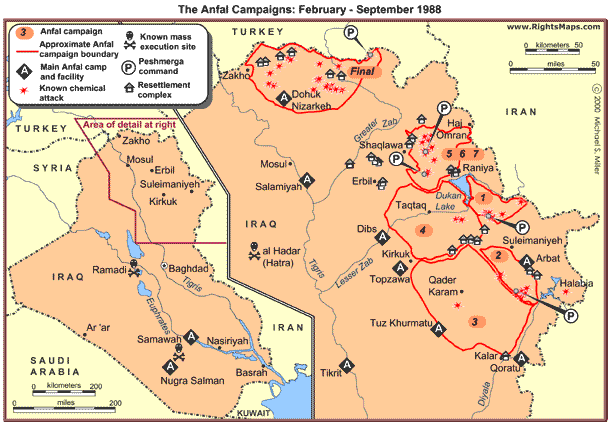On 16th March 1988, the Ba’athist regime of Saddam Hussein in Iraq launched an unprecedented and deadly poison gas attack against the Kurdish town of Halabja, killing some 5,000 civilians and inflicting life-changing injuries on thousands more. The attack was part of Saddam’s Al-Anfal campaign against Iraqi Kurdistan and the Kurdish people in general during the final days of the Iran-Iraq War.

Saddam Hussein had at one point been feted by Western and Middle Eastern leaders alike as a potential stabiliser of Iraq, a secular leader able to temper the simmering resentment between the Shiite and Sunni Muslim populations of the country. The restive Kurdish people, however, were never welcome in Saddam’s Iraq.
The Kurds had long campaigned for an independent state in Northeast Iraq and adopted increasingly militaristic language and methods in pursuit of their ambition. Between 1961 and 1970 sporadic fighting between troops loyal to the Kurdistan Democratic Party (KDP) and the Iraqi Army broke out with thousands of ensuing casualties. Calls for a peace process and a promise of Kurdish autonomy halted the violence in 1970, although it was soon revealed that the Iraqi government had little intention of offering the Kurds territorial concessions.
This, in turn, led to the second Kurdish-Iraqi War (1974-1975) during which Saddam Hussein made his name as a ferocious general who helped batter the Kurds into submission. The experience would stay with Saddam after he became Iraqi President in 1979 and, after a further Kurdish rebellion in 1983, his mind was made up. If the Kurds could not be appeased or driven out by harsh government policies, then they had to be annihilated.
Using the Iran-Iraq War as cover from the prying eyes of the international community, Saddam launched a simultaneous offensive against the Kurds that culminated in the barbaric attack on Halabja. 182,000 Kurdish and other minority civilians died in the offensive, some from aerial bombardment, others from artillery fire and many more in concentration camps.

It would take until after the Gulf War in 1991 for the international community to fully recognise the plight of the Iraqi Kurds. A no-fly zone was created over most of Kurdistan and the Iraqi military was forced to withdraw, allowing for Kurdish autonomy. Despite this semblance of self-determination, Saddam Hussein continued to undermine the Kurdish community throughout the 1990s without actually engaging in full-scale military conflict once again.
It is little wonder, then, that the Kurds helped to oust Saddam after the Anglo-American invasion of Iraq in 2003. Since the withdrawal of US and British troops, Iraq has been plagued by horrendous sectarian violence, with car bombings and suicide attacks a daily reality that cause massive loss of life. It is ironic that the tyrant who the American and British fought to topple had been the man responsible for preventing such bloody internal strife, whatever repressive methods he may have used.

More positively, Kurdish development has been impressive since Saddam was toppled. Amazingly, Iraq’s President is now a Kurd, Jalal Tablani. Iraqi Kurdistan has largely been left in peace in recent years and its leaders, led by President Massoud Barzani, are keen to keep a low profile and enjoy a rare period of stability. Whilst the Halabja anniversary offers a chance for reflection, it is one most Kurds are unlikely to dwell upon.
Violence perpetrated against and by the Kurds is now largely confined to southeastern Turkey, where another secular state is embroiled in ethnic conflict. The proximity of Turkish and Iraqi Kurdistan means that the conflict is always liable to spill over the border and the temptation for the Iraqi Kurds to aid their brothers in Turkey will always be a tempting one.
Nevertheless, it is possible to tentatively declare that the Iraqi Kurds have turned a corner. Think how much things have changed in twenty-five years since that terrible day in Halabja. Kurdish autonomy has increased and been secured, Saddam Hussein is no more and Iraqi tensions are more religiously-driven than ever before, with ethnicity no longer the sole cause of conflict.
Hopefully one day there will be peace for all Iraq, Kurds included, where people can live side by side regardless of faith or creed. It may take many a year to realise this Utopia.
